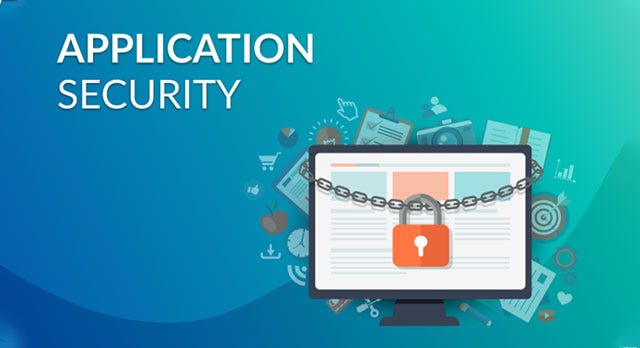What is the importance of application security?

The digital world of today has made applications an essential part of our everyday existence. There are numerous applications we utilise on a daily basis, ranging from social media to financial institutions to Amazon and Google Maps. Our connection with these applications strengthens with our increasing dependence, and so does the likelihood of becoming a target victim of a cyberattack.Application security is now required in order to safeguard sensitive data along with guaranteeing the uninterrupted operation of these apps. This extensive post will go over ten strong arguments for why application security needs to be a primary concern for people, companies, as well as organisations.
1. Preserving Private Information
Applications must be secure because they handle a wide range of sensitive data. These digital platforms are frequently used for the processing, storing, and transmission of financial records, proprietary data, as well as personal information.A security lapse in an application can have disastrous consequences, giving malevolent actors access to and use of this treasure mine of private data. Considering a few of the outcomes being corporate espionage, financial fraud, and identity theft, which can lead to significant material and intangible losses to both individuals and organisations, there is the need for strong application security controls to ensure this invaluable data does not get into the wrong hands.
2. Preserving Client Confidence
Trust continues to be critical for businesses in the fiercely competitive digital space. A single security event can quickly erode the trust consumers have in a brand or business, causing mass abandonment and loss of income. Strong application security measures are prioritised . The firms reveal their unwavering dedication to keep client data confidential and adhere to the tightest requirements in terms of privacy and protection.In addition to protecting sensitive data, this proactive approach gives customers confidence and encourages advocacy and long-term loyalty.
3. Adherence to Rules
The previous industries concerning non-compliance were dictated by federal regulations, guidance, and strict state rules. All of the guidelines were established to safeguard the safety and privacy of the content and data. Moreover, non-compliance also leads to devastating financial fines, legal costs, and irreparable reputational damage to the organisation. Application security is essential to following these important laws. Strong security protocols guarantee that sensitive data is managed, processed, as well as kept in compliance with these regulations, reducing the chances of non-compliance and allowing businesses to function legally.
4. Avoiding Monetary Losses
As can be seen, cyberattacks and data breaches may have destructive financial consequences. Even if IT companies experience a lack of trust by being attacked, businesses are likely to experience the loss of money in the face of huge legal sums, an expensive recovery operation, and a collapse in the number of customers and revenue.By putting in place thorough application security measures, businesses can reduce risk in addition to avoid the disastrous financial effects of security breaches. Businesses can safeguard their revenue and preserve financial stability in an increasingly unstable cyber environment by giving application security top priority.
5. Maintaining Business Uptime
Applications now power essential operations and procedures for modern businesses, making them invaluable tools. Operations may come to a complete stop due to a security breach or other disruption to these apps, which could lead to lost productivity, missed deadlines,along with significant losses in revenue. Strong application security controls protect these systems’ continuous availability and dependability, allowing companies to continue operating as usual and avert expensive disruptions that could endanger their operations.
6. Guarding Intellectual Property
Many companies have their intellectual property as part of their competitive advantage. In many applications, there is highly confidential proprietary software including state-of-the-art algorithms, secret source code files, and other closely guarded trade secrets. In case of compromised application security, unscrupulous individuals may access this intellectual property and use it for their own gain, which may be catastrophic. Strong application security controls are essential for protecting these precious resources, guaranteeing the ongoing safety of a company’s creative projects, and maintaining its competitive edge.
7. Improving Brand Image and Reputation
In the digital age, a company’s reputation is closely linked with how the company protects customer data and how strong its securities are. Overnight, a company’s reputation will be damaged as a result of a successful cyberattack or data breaching, as citizens will lose trust and customer devotion will decline.This proactive approach enables organisations to establish an encouraging picture and long-term credibility with its stakeholders and people in a society that is becoming increasingly preoccupied with protection.
8. Steer clear of legal obligations
If a security incident or data breach occurs, the organisation shall face massive financial liabilities or even claims from the affected parties or the government. Failure to implement the required security shall also be seen as negligence, and the organisation might be subjected to financial penalties and legal actions. Investing in application security provides a critical buffer that eliminates said risks and proves that the organisation is genuinely committed to protecting user information and requirements.
9. Activating Remote Secure Access
Cloud-based apps and remote work have increased demand for secure remote access, which is why businesses are concerned. Encrypted communication channels along with strong authentication procedures are examples of application security features that guarantee sensitive data protection even when accessed remotely. These precautions maintain the privacy and accuracy of data, allowing for easy and safe remote operations without sacrificing security.
10. Promoting a Security-Aware Culture
Application security is a complex task that encompasses more than just the technology; rather, an organisation’s whole culture must be focused on security. Companies may foster a culture of security consciousness in their staff with robust security and protections and provide the employees best practices for securing their environment. These counter-threat-actors staff personnel can better detect probable threats, exhibit more proactive event-reporting behaviour, and contribute to the security culture of the business as a whole through vigilance and participation.
Conclusion
Application security is now a basic need in the always changing digital landscape, not an optional one. The significance of mobile application security cannot be emphasised, as it plays a vital role in safeguarding confidential information, upholding customer confidence, guaranteeing regulatory compliance, In addition to providing safe remote access. Individuals and organisations can reduce risks, prevent financial losses, safeguard intellectual property, and promote a security-aware culture by giving application security measures top priority.







